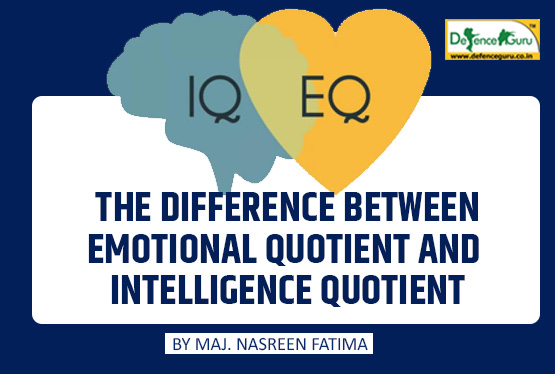1. (EQ) is the ability to understand and recognize one’s own emotions and those of others.
Its important to grasp the value of emotional intelligence and apply that knowledge to self, individuals need to be aware of the key attributes of those who possess high EQ. Individuals who aspire to be a leader and those who have leadership quality imbibe these qualities too are on a distinctive path for success in their profession.
2. Lets take examples of qualities for better understanding of Emotional intelligence which are as follows:
a) Self-awareness
The first step in attaining a high level of emotional intelligence is understanding and knowing oneself. Self-awareness enables people to be honest with themselves and to accept and harness their strengths, weaknesses, desires, and shortcomings in order to make appropriate life and business decisions.
People who are self-aware are able to recognize how their emotions and actions affect themselves and other people, as well as the performance of their jobs.
In stressful work environments, leaders who are self-aware can more easily deal with the stresses and pressures that come their way, such as difficult clients, tight deadlines, and other demanding situations.
Knowing one’s own emotional triggers can be helpful for individuals to handle situations by taking a step back, realizing how they are feeling, and acting in a controlled and effective manner.
b) Self-regulation
Another important aspect of EQ involves discipline and self-regulation. Individuals with this attribute are able to control their impulses, which include maintaining calm and not overreacting to mistakes.
Individuals who take time to think and reflect on a difficult situation or missed opportunity are more apt to uncover their own errors and the errors made by their team. Along with letting go of mistakes, emotional intelligence enables people to say ‘no’ both to themselves, and to others. By confidently saying ‘no’ to some requests and commitments, individual show that they value their current commitments and are able to set boundaries, allowing them to successfully complete the tasks they choose to take on. Self-regulation enables one to intelligently react to, embrace, and adapt to change. Change happens quickly and without warning, so that one can work smoothly during times of transition.
c) Empathy
Empathy refers to the awareness and consideration of the feelings of others. This dimension of EQ is essential in many aspects of life. Individuals who exhibit empathy are able to build relationships ,gain the trust of others, be a part of effective team members.
Empathy is necessary for understanding new cultures and working environments, and for avoiding conflict and misunderstandings. Empathy when shown to others foster trust and strong relationships.
d) Motivation
Emotionally intelligent individuals are motivated and have the ability to motivate others. They have a passion for achieving their goals and are driven not by rewards but by accomplishing what they set out to do.
Motivation pushes leaders to work tirelessly in the face of challenges, to ask questions about the ways things are done, and to explore new methods for improving themselves and others. Their desire to learn and feel pride in their work set an example that is often emulated by their teams and their organization. Individuals who are motivated often inspire the people around them to grow, improve, and succeed.
e) Social skills
Social skills are essential for emotional intelligence in the work environment. Having effective social skills encompasses all of the attributes of EQ. These skills helps in managing relationships and achieving goals. Most individuals—even the most successful people, charismatic leaders—are not able to accomplish important objectives alone. Possessing social skills is extremely important. It does not just mean being friendly to others. It involves understanding people, developing relationships, and motivating others to accomplish objectives.
Thus, Emotional Quotient is bigger field of knowledge to understand . This encompasses individual's ability to perceive, control, evaluate, and express emotions measurement of a person's ability to monitor his or her emotions, to cope with pressures and demands and to control his or her thoughts and actions. . For Example- A workplace where people feel confident in speaking their minds, exchanging views, and expressing their emotions. They are demonstrating emotional intelligence.
3. EQ distinguishes emotional capacity as a distinct type of intellect.
The average EQ score is in the range of 90 – 100, while the perfect EQ score is 160. The examples of EQ tests are:
• Abilities based tests
• Trait-based tests
• Competency-based tests
• Behavior-based tests
4. On the other hand, Intelligence quotient or IQ is a score derived from a set of standardized tests
developed to measure a person's cognitive abilities i.e intelligence in relation to their age group. The concept of IQ was invented in the year 1904 by Alfred Binet. The equation used to calculate a person's IQ score is Mental Age / Chronological Age x 100.
5. IQ tests begin to assess this by measuring short- and long-term memory.
How well people can solve puzzles and recall information they've heard — and how quickly they respond. Every student can learn no matter how intelligent. The IQ tests can helps assessers to figure out which students who are intelligent and those who would benefit from such extra help. Thus, IQ is basic intelligence test. Examples of the types of questions for IQ test includes excercises:
• Analogies (mathematical and verbal)
• Pattern driven (spatial and mathematical)
• Classification
• Visual
• Spatial
• Logical
6. Intelligence quotient is thus a measure of one’s ability to reason and solve problems.
It essentially reflects how well you did on a specific test as compared to other people of your age group. While tests may vary, the average IQ on many tests is 100, and 68 percent of scores lie somewhere between 85 and 115. When it comes to Defence services’s SSB Assessment the knowledge of Intelligence quotient and Emotional quotient is extremely important as in stage one and stage two both the aspects are tested through series of tests conducted.
------------------------------------------------------------------------------------------------------------------------------






